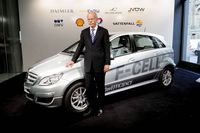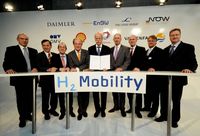Mercedes-Benz Partners in Hydrogen Roll Out - "H2 Mobility"
BERLIN, GERMANY – September 14, 2009: On Thursday 10th September, leading industrial companies signed a Memorandum of Understanding (MoU) in Berlin with the participation of the German Minister of Transport, Wolfgang Tiefensee. The agreement intends the evaluation of the setup of a hydrogen infrastructure in Germany so as to promote serial production of electric vehicles with fuel-cell. This marks a major step towards the commercialization of such locally emission-free vehicles. The partners of the initiative “H2 Mobility” are Daimler, EnBW, Linde, OMV, Shell, Total, Vattenfall and the NOWGmbH National Organisation Hydrogen and Fuel Cell Technology. Thereby the co-operation is also open for further partners interested in the project. In recent years significant progress has been made in Germany with the development of hydrogen based technologies in the mobility sector, identifying the country as a potential start-market in the context of a broader European perspective.
This has been made possible by the continuous commitment of a significant number of industrial stakeholders and comprehensive support by the German government with the common aim of preparing for the commercialization of electric vehicles with fuel cell and embedding hydrogen- and fuel cell technologies in the future powertrain portfolio.
Current demonstration projects like the Clean Energy Partnership involving fuel retail companies, utility providers and engineering companies have shown that the production, storage, transportation and deployment of efficient equipment for compressed gaseous hydrogen are technically feasible.
Moreover, leading automobile manufacturers recently announced a joint statement on the development and market introduction of electric vehicles with fuel cell. From 2015 onwards they anticipate several hundred thousand units over life cycle on a worldwide basis.
The MoU goes back to a joint initiative by Daimler and Linde aimed at providing sufficient hydrogen fuelling station infrastructure, which is the key to establishing electric vehicles with fuel cell on the market.
The MoU comprises two phases.
Phase One includes the evaluation of options for an area-wide roll-out of hydrogen fuelling stations in Germany and the definition of a joint business plan agreement including an analysis of possible public support measures.
In Phase One partners intend to leverage plans to install new hydrogen fuelling stations by 2011. This will take place within the framework of the German economic stimulus package (Konjunkturpaket II) and other national and state programs to jointly address standardization and cost reduction issues.
Subject to the positive and satisfactory outcome of such a business case agreement the partners will implement the corresponding action plan in Phase Two. The nation-wide roll-out of hydrogen fuelling stations will be continued; supporting the introduction of series produced hydrogen powered vehicles in Germanyaround 2015.
Wolfgang Tiefensee, Minister for Transportation, Building and Urban
Affairs
“Today, after more than 100 years of combustion
engines and the dominance of oil, we are facing a new technological era in
the transport sector. Germany, with its excellent ideas from all over the
country, is to become the market leader for modern drive technologies. This
will secure and create new employment in the markets of the future. Our aim
is to continue consistent and systematic promotion of electromobility based
on batteries and fuel cells. Today we can see that Germanyis setting the
pace when it comes to hydrogen and fuel cell technology. We are aiming at
establishing the nation-wide supply with hydrogen in Germanyat around 2015
in order to support the serial-production of fuel cell vehicles.”
Dr. Dieter Zetsche, CEO Daimler AG and head of Mercedes-Benz
Cars
“The only tailpipe emission from fuel-cell vehicles is
water vapor. That’s good for the environment and for people –
and it’s the reason why we want to commercialize this technology as
soon as possible. But the widespread adoption of fuel cells will only occur
when drivers can readily refuel with hydrogen. To accomplish that end,
we’re working together with oil companies, energy providers and
public policy makers to help drive the development of the necessary
infrastructure.”
Prof. Dr. Wolfgang Reitzle, CEO Linde AG
“Our jointly
expressed commitment to hydrogen-based mobility sets the course for a
low-emission and environmentally friendly future. We see ourselves as
pioneers in the field of hydrogen technology and will do everything we can
to live up to our aspirations with our accomplishments in the areas of
hydrogen production, storage, distribution and fuelling
technology.”
Dr. Klaus Bonhoff, Managing Director (Chair) NOW GmbH Nationale
Organisation Wasserstoff- und
Brennstoffzellentechnologie
“This commitment of market leading
companies is a cornerstone for sustainable mobility in the future.
Leveraging the ongoing NIP this MoU is the basis for a considerable
contribution of industry partners and the federal government paving the way
for the commercialisation of hydrogen vehicles.”
Hans-Peter Villis, CEO EnBW AG
“Regardless of whether
vehicles are refuelled with hydrogen or electricity, it remains a fact that
these innovative drive technologies will only be sustainable with a
reliable infrastructure and only with CO2-free electricity for hydrogen
production or for recharging batteries.EnBW will support both technologies
– with its technological know-how in the power generation field and
its large proportion of CO2-free electricity.”
Dr. Dieter Tuppinger, Managing Director OMV Refining and Marketing
GmbH Deutschland GmbH
“In its role as supplier, OMV sees an
ongoing responsibility to make future fuels available close to the customer
in response to future changes.For example, additional hydrogen fuelling
stations in the decades ahead can support the development and series
production of competitive vehicles with fuel cell technology – for
more efficient mobility without local emissions.”
Dr. Peter Blauwhoff, Chairman of Management Board of Deutsche Shell
Holding
“The tasks facing us can only be mastered by
cooperation between the industries involved and with support from
governments.The agreement signed today leaves the door open for new
partners. And that is essential in view of the challenges that still need
to be tackled.It thus marks an important step towards solving the problems
of establishing a hydrogen infrastructure in Germany.”
Michel Mallet, Managing Director, Total Deutschland
GmbH
“Our field experience gained over the years in siting
Hydrogen Refuelling Stations in Germany has allowed us to demonstrate that
hydrogen based technologies may provide a sound answer to clean mobility. A
significant leapfrog for both hydrogen vehicles &infrastructure deployments
is now required, and this agreement intends to achieve this ambitious
target.”
Udo Bekker, Member of the Board, Vattenfall AG
“With its
climate protection strategy ‘Making Electricity Clean’,
Vattenfall is pressing ahead with the expansion of environmentally sound
individual mobility. By means of hydrogen produced using power from
renewable energy sources, we will supply a low-emission fuel and ensure
‘green’ mobility. In Hamburgwe are already putting this into
practice: by the end of this year we will start work there on the
construction of Europe’s biggest hydrogen filling station.”
The hydrogen fuelling station infrastructure in Germany
The
setup of a public hydrogen infrastructure is crucial for the successful
introduction of fuel-cell vehicles. First hydrogen centres have been
established in urban agglomerations such as Berlinand Hamburg.
Seven of the current thirty hydrogen fuelling stations in Germany are integrated into public gas stations. Germany thereby has a leading position regarding the hydrogen infrastructure in Europe.
Already five to ten hydrogen fuelling stations can secure a first supply in a major city. By connecting those urban agglomerations - such as Berlinand Hamburg-with supply corridors on main arteries, the essential prerequisites for a nationwide development are created.
The fuel-cell fleet
A fleet of 40 hydrogen vehicles is part of
the Clean Energy Partnership (CEP) in the key regions Berlinand
Hamburg.
The CEP is aiming to demonstrate the suitability for daily use of hydrogen as an alternative fuel for vehicles and to test the infrastructure of hydrogen fuelling stations. Daimler already presented the first fuel-cell vehicle in 1994.
Since then the company invested more than one billion Euros into the development of fuel cells. With more than 100 test vehicles and over 4.5 million kilometres of test runs, the automotive manufacturer from Stuttgartholds one of the largest fuel-cell vehicle fleets of passenger cars and buses worldwide.
The small series production of the B-Class F-CELL will start at the end of 2009.
The first prototype of the new generation of fuel-cell buses will also be presented this year.




